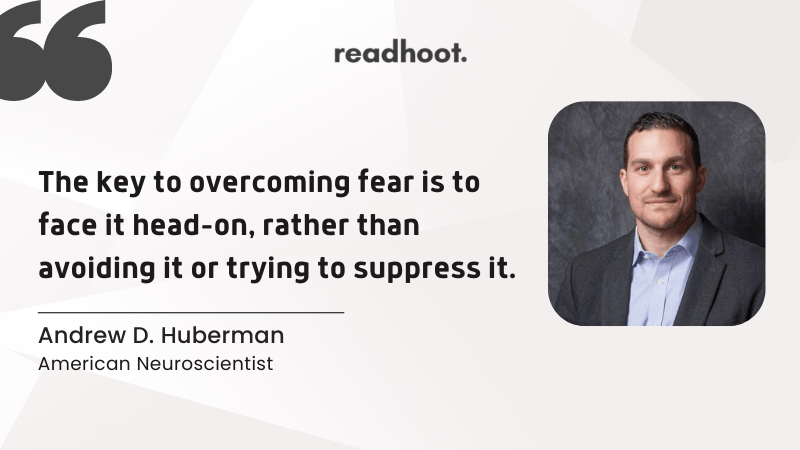Have you ever wondered how your brain works, and how it shapes your thoughts, feelings, and actions? Andrew D. Huberman, a neuroscientist, and professor at Stanford University, has spent his career studying the brain and its functions.
With his deep expertise and engaging teaching style, he has become a popular figure in neuroscience, inspiring many people to learn more about the brain and how it impacts our lives.
In this article, we’ll explore some of the most notable Andrew D. Huberman quotes, covering topics ranging from neuroplasticity and sleep to stress management and positive emotions.
So sit back, relax, and let’s dive into the fascinating world of the brain, as seen through the eyes of Andrew D. Huberman.
Who is Andrew D. Huberman
Andrew D. Huberman is a renowned neuroscientist and professor at Stanford University. Huberman is known for his engaging teaching style and has become a popular figure in the neuroscience community. He has provided many valuable insights into the workings of the brain and its impact on human behavior and well-being.
Here are some well-known facts about Andrew D. Huberman:
- He received his undergraduate degree in Biology from the University of California, San Diego, and his Ph.D. in Neuroscience from the University of California, Los Angeles.
- Huberman is currently a professor of Neurobiology and Ophthalmology at Stanford University, where he runs a research laboratory focused on visual system development and function.
- He has received numerous awards and honors throughout his career, including the NIH Director’s Pioneer Award, the McKnight Foundation Neuroscience Scholar Award, and the Society for Neuroscience Young Investigator Award.
- Huberman has been featured in many popular media outlets, including The New York Times, Scientific American, and NPR, where he has shared his insights on topics such as sleep, stress, and human behavior.
- He enjoys traveling, taking photos, and surfing and sometimes incorporates these interests into his teaching and research.
Famous Andrew D. Huberman Quotes
Positive thinking is not about being delusional. It’s about learning to control internal processing and knowing it’ll shape your external environment.
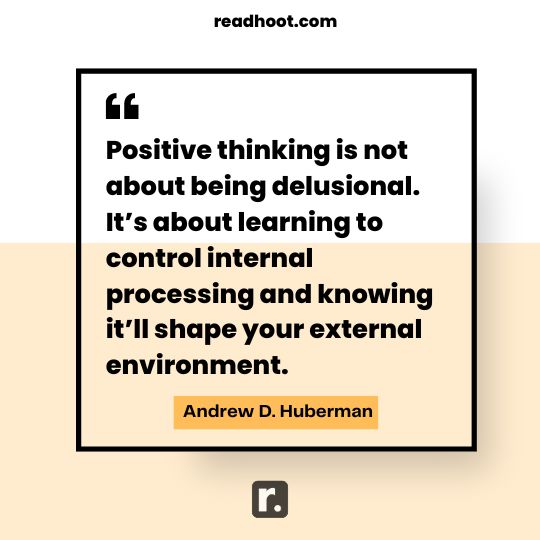
Testosterone makes effort feel good.
I think a deliberate practice of relishing or enjoying what we have is so powerful and not just going through the motions, if we’re not enjoying it and we’re just waiting for the end result, we’re going to be unhappy.
Fear is a sensation. Courage is a decision.
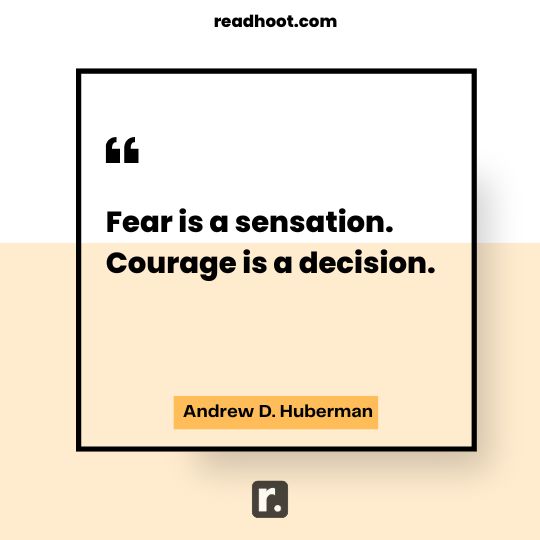
We can use play as a means to enhance neuroplasticity and explore novel situations, regardless of age.
Gratitude sounds like complacency, and people fear that they’re not going to be persistent. But serotonin resets dopamine, which puts you back in the fight and allows you to fight longer and further.
“Diet” is not just about weight. It’s also a potent tool for treating mental health challenges: depression, bipolar depression, ADHD, schizophrenia, and more.
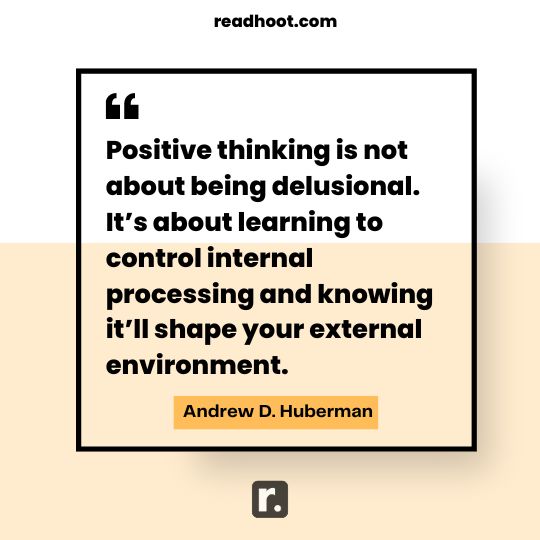
The best nootropic is sleep.
I think a deliberate practice of relishing or enjoying what we have is so powerful and not just going through the motions, if we’re not enjoying it and we’re just waiting for the end result, we’re going to be unhappy.
The more you can engage in activities that make you feel good, the more resilient you become to stress.
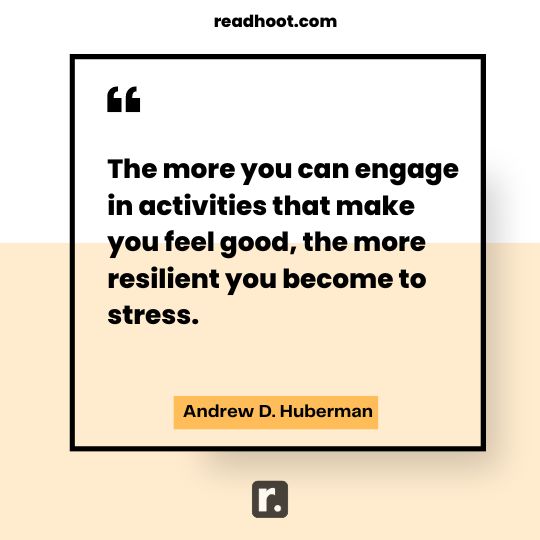
Dopamine is the molecule that makes us look at things outside the boundaries of our skin, to be in pursuit of things.
The human species was given this tremendous gift of neuroplasticity, the ability to change ourselves and be better in deliberate ways. And my definition of greatness is anyone that’s making that effort, even in a tiny way, just to take this incredible machinery that we were given — this nervous system — and leverage it toward being better, feeling better, and showing up better for other people.
The key to overcoming fear is to face it head-on, rather than avoiding it or trying to suppress it.
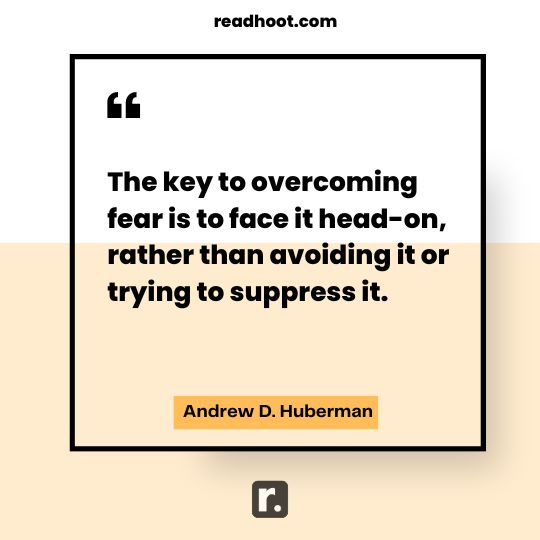
Serotonin is about feeling like we have enough in our immediate environment. And it’s so powerful because unless that serotonin box is checked off periodically, we cannot lean back into the dopamine outward pursuit process for very long.
I think gratitude is wonderful, it resets the system so that you can be in pursuit.
This fear of death is something we all live with and struggle with, so we have to remember to have fun.
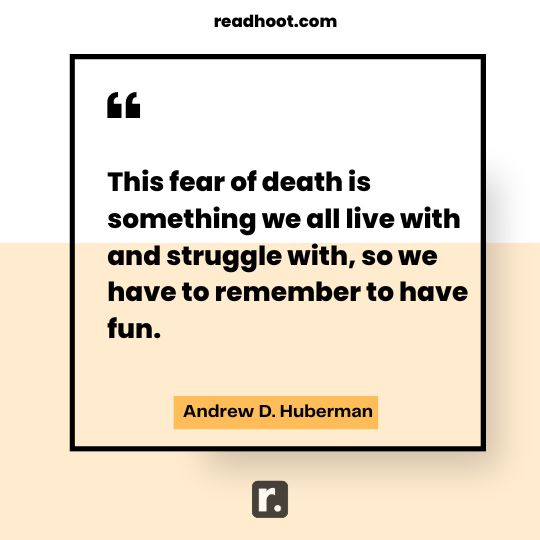
If you’re focusing on how someone else is failing, what’s wrong with X, Y or Z, you’re wasting the valuable neural real estate, building less, creating less, and slipping backward. That’s the slow lane. We all have limited forebrain resources — use them wisely.
What you focus on, grows.
The power of visualization is real. By visualizing our goals and dreams, we can make them a reality.
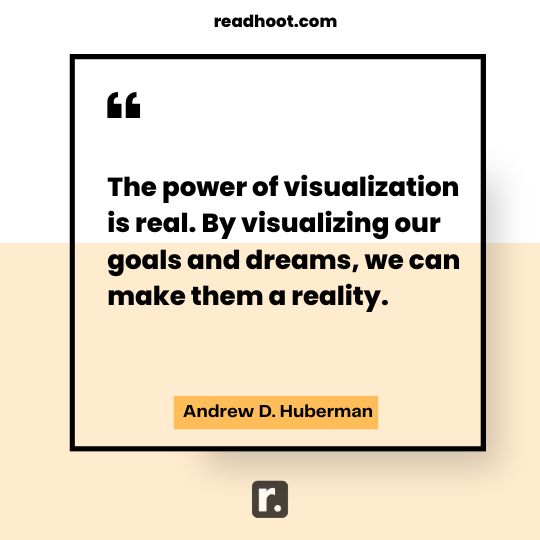
Obviously, eye masks, etc are an easy solution if you can’t control your ambient sleep environment.
We can change our brains and change our behavior, and that’s a really powerful message.
We all have the capacity to experience joy, but it’s up to us to cultivate it through our thoughts, actions, and habits.
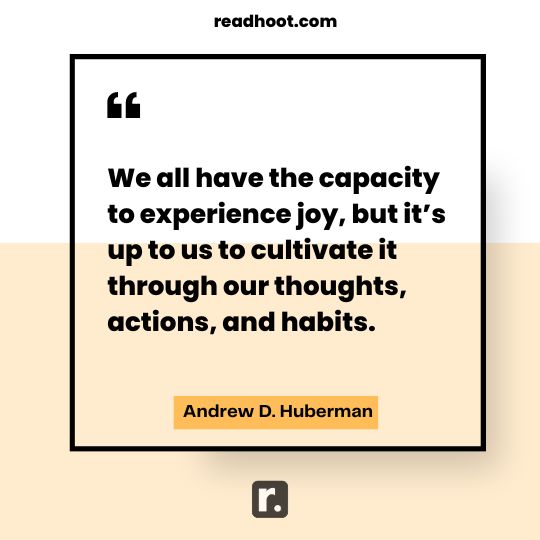
The key to success is consistency, not intensity.
Keeping the lights very dim/dark during sleep appears critical; even 100lux (through closed eyelids of course) can alter autonomic tone & morning insulin. The light meter app is free & does a decent job to measure.
The more you learn, the more you realize how much you don’t know.
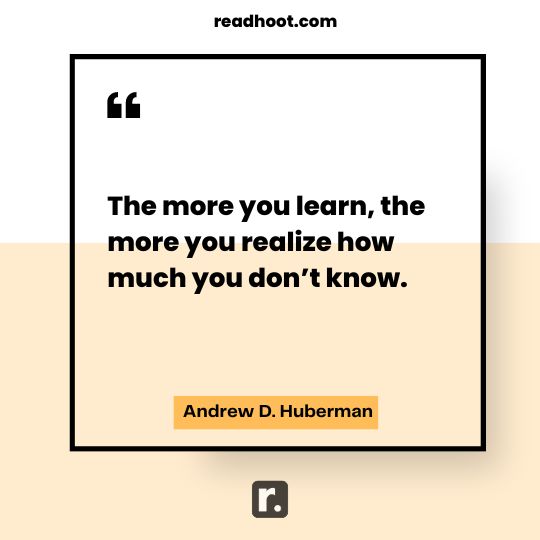
There’s no such thing as a ‘good’ or ‘bad’ emotion. All emotions serve a purpose and can be useful if we learn to understand and regulate them.
Our thoughts have the power to shape our reality. By focusing on the positive, we can create a more positive experience of the world.
The body and brain respond to any form of stress in the same way, whether it’s psychological or physical.
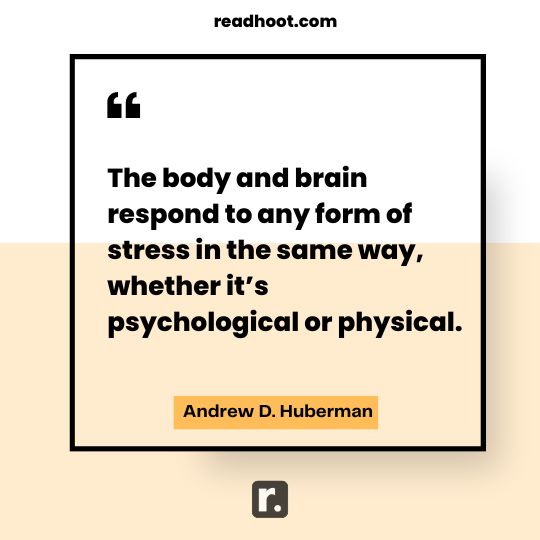
Stress is not always bad. In fact, a certain amount of stress can be beneficial for growth and learning.
The term physiological sigh was coined by scientists in the 1930s; not by me. It’s a naturally occurring pattern of breathing that offsets CO2. It has some overlap with traditional breathing techniques but is distinct. Not meant to replace other languages.
The mind is the most powerful tool we have for creating the life we want.
Quotes by Andrew D. Huberman
The power of the mind to control our behavior and biology is one of the most fascinating yet understudied areas of science.
The mind is a powerful tool for overcoming fear and anxiety. By reframing our thoughts and beliefs, we can overcome even the most daunting challenges.
The brain is a prediction machine. It’s constantly making predictions about what will happen next based on past experiences and sensory input.
Keeping your circadian clocks aligned with the local light-dark cycle is a relatively slow integrative process; 5 min of sun one day, 15 the next, etc. is fine. Your sleep-wake cycle generally reflects the averages of light viewing and other activities across the last 2-3 days.
The key to better sleep is to set yourself up for success by creating a calming environment and avoiding stimulating activities before bed.
The brain is a use-dependent organ. The more we use it, the stronger and more resilient it becomes.
The most important thing we can do for our health is to maintain good relationships with others.
The mind is capable of incredible creativity and innovation. By cultivating a curious and open mindset, we can unlock our full potential.
The more we can understand and regulate our emotions, the better we’ll be able to navigate the challenges of life.
Happiness is not a destination, it’s a journey. It’s something we cultivate in the present moment through our thoughts and actions.
The mind and body are intimately connected. Taking care of one is essential for taking care of the other.
Neuroplasticity is the brain’s ability to change and adapt in response to experience. It’s a powerful tool for personal growth and transformation.
The mind is like a garden. We can choose to cultivate positive thoughts and emotions, or we can let negativity take root.
Our brains are wired to seek out pleasure and avoid pain. By understanding this, we can leverage our motivation to achieve our goals.
The mind-body connection is real. By using techniques like deep breathing and visualization, we can tap into the body’s natural healing mechanisms.
Meditation is a powerful tool for training the mind and cultivating inner peace.
The mind is like a muscle. The more we use it, the stronger it becomes.
The human species was given this tremendous gift of neuroplasticity, the ability to change ourselves and be better in deliberate ways. And my definition of greatness is anyone that’s making that effort, even in a tiny way, just to take this incredible machinery that we were given — this nervous system — and to leverage it toward being better, feeling better, and showing up better for other people.
The mind is capable of incredible feats, including healing the body and achieving extraordinary goals.
The mental strain you feel when you’re learning something is the trigger for neuroplasticity for your brain to change. Neuroplasticity is a process of taking something where there’s a duration path and outcome — where I’m working hard. I’m thinking hard. Maybe it’s a hard conversation. Maybe it’s a business plan. Maybe it’s a scientific career. And the goal of neuroplasticity is to make things reflexive. So you don’t have to think about them.
What did you learn from these quotes by Andrew D. Huberman?
So, what did you learn from these quotes by Andrew D. Huberman? Perhaps you discovered the importance of cultivating a growth mindset, or the role of our perceptions in shaping our reality.
Maybe you were inspired to take steps to prioritize your sleep, manage your stress, or develop a consistent mindfulness practice.
Remember that achieving optimal brain function and mental performance is not a one-time destination, but an ongoing journey. By incorporating Huberman’s teachings into your daily life and staying open to new ideas, you can continue to improve your cognitive abilities and reach your highest aspirations.
In other words, keep learning, practicing, and experimenting with what works best for you, and you will gradually unlock your full potential.












